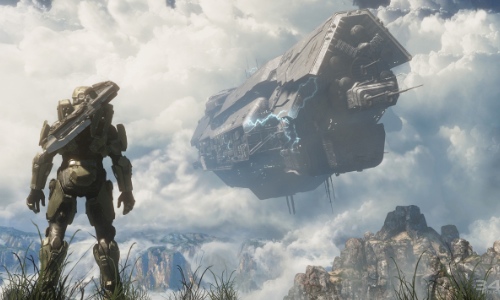Review: Halo 4

Halo isn’t just a video game – it’s a gigantic, multimedia behemoth, crushing all in its path under its metal-plated boots. Since the original Halo launched on Microsoft’s first Xbox, the franchise has grown to fill an entire universe, with spin-offs including an animated web series, a graphic novel and an encyclopedia full of Halo lore.
The insatiable appetite for the sci-fi epic has made it one of the most successful series ever created, in any format (if the latest title doesn’t gross $1bn, I’ll eat my Xbox).
And, like any successful franchise, Microsoft knows how to keep its fanbase lusting after more. Halo 3 was released in 2008 and fans have been forced to settle for spin-off titles, including Halo Wars, a real-time strategy game set in the Halo universe, and Halo 3: ODST, which sees players take the role of a new protagonist, further fleshing out the operatic back-story.
Halo 4 has a lot to live up to. You won’t be disappointed. It’s one of the most stunning games I’ve ever seen: from the cinematic opening sequence to the wonderfully rendered alien landscapes, it is relentlessly pretty.
The single-player game relies far more on tactics than previous iterations. Gone are the days when you could jump headlong into the action and hope to survive. Even on “normal” difficulty, this is a sure-fire way of ending up skewered on an Energy Sword. The plot is engaging enough and the voice acting is as adept as most Hollywood blockbusters.
It does, however, suffer from the same problem that has niggled at me throughout the lifespan of the franchise, in that the regularity of checkpoints drain some of the tension – if you die (and you will die, a lot), you know you’ll be able to restart from a couple of minutes back. The flip-side is you don’t spend hours wading through the same parts of the game, giving it an arcadey “pick-up-and-play” feel.
But it is multi-player that drives grown men to sit in the dark wearing wi-fi headsets so they can discuss tactics with remote team-mates. And it is about as much fun as you can have on a console. The levels are brilliantly designed and the combat system, honed over more than a decade, makes encounters feel satisfyingly weighty.
Every well directed gun-shot, every kamikaze attack, every time someone crept up behind me and punched me in the back of the head had me giggling like a schoolboy. What more could you ask for?
First published in City A.M.

